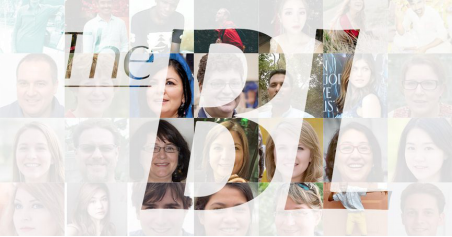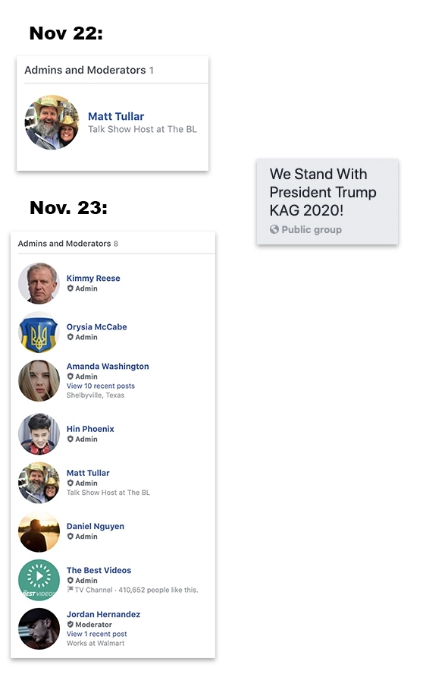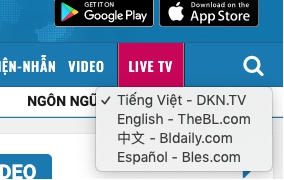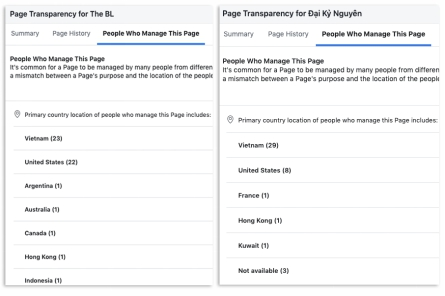
Since October 2019, Snopes has been following the activities of a digital media outlet called “The BL” — short for “The Beauty of Life” — which has an explicitly pro-Trump editorial strategy. In several ways, as we have shown in multiple investigations, this outlet flouts Facebook’s terms of service largely without consequence. At the time of this reporting, The BL is in the process of building and maintaining a labyrinthine network of pro-Trump Facebook groups administered by fake profiles to artificially inflate its reach — activity that appears to be a textbook example of how to violate the “coordinated inauthentic behavior” rules Facebook claims they enforce.
Though The BL maintains a New York business address and its editorial staff includes several U.S.-based employees, the outlet as a whole is literally the English-language edition of Epoch Times Vietnam, and much of The BL’s inauthentic behavior appears to originate in Vietnam. Facebook’s inability to detect and counter malicious foreign actors, like the Russian Internet Research Agency (IRA) or the “Macedonian teens” who profited from fake pro-Trump news, was a central failing of Facebook in the lead-up to the 2016 presidential election, according to several intelligence agencies. Facebook maintains they take this kind of threat seriously as their platform prepares for future elections.
Facebook’s actions against The BL — an outlet that we have demonstrated creates fake American profiles from abroad to push U.S political content — appear to be minimal, though. While 282 of the 315 BL-associated profiles we identified as fake appear to have been removed following our November 2019 report, Facebook seems to have taken no broader action against the media outlet as a whole, or against most of the Facebook groups created by this fraudulent activity. Facebook did not respond to our request for clarification on its apparent action against The BL’s fake profiles, so we have no idea if Facebook or its automated systems are responsible for the removal of those profiles.
Facebook’s Response to Snopes’ Reporting on The BL
In our November 2019 report, Snopes identified 315 fake profiles used to administer 176 groups or pages with pro-Trump names. The primary or sole purpose of these groups was (and is) to share links to The BL. As part of that reporting, we asked Facebook if this behavior constituted coordinated inauthentic behavior, which Facebook itself defines as “groups of pages or people work[ing] together to mislead others about who they are or what they’re doing” and explicitly includes the use of fake profiles or actions that “artificially boost the popularity of content.” “As always,” they told us in November, “we will take action if we find violating activity.”
The company claims to advertise such takedowns when they occur. In a November 2019 press conference, Facebook told reporters, “When we expose [coordinated inauthentic behavior], we announce it publicly and we remove it from the platform.” Due to the actions of either automated systems or direct intervention from Facebook, some 280 fake profiles we identified no longer exist on Facebook, but if Facebook did remove those fake profiles associated with The BL, they are not taking credit for that action. And unfortunately, we have identified at least 400-plus fake profiles that have been created and utilized by The BL since our last report:
[Database — Remaining and New Fake Profiles, Groups, and Pages Associated with The BL]
These profiles, which now make use of artificially generated faces as their profile pictures, have swiftly replaced the ones Facebook or its automated systems may have removed. Like their fallen comrades before them, these accounts continue the busy work of engaging with and promoting content in The BL’s “pro-Trump” Facebook groups. While these numbers may seem small compared to the 7.7 million fake profiles Facebook claims to remove on any given day, these fake profiles are aimed at growing an audience we estimate already includes over 28 million (largely real) followers.
Furthermore, the deletion or removal of fake profiles — whoever is responsible for it — does not seem to deter The BL’s use of coordinated inauthentic behavior. Not only does Facebook’s removal not keep pace with The BL’s production of new fake profiles, but the groups created by and with the support of those fake profiles remain untouched by Facebook. Our November report identified 103 BL-associated Facebook groups, but only one appears to have been removed. This state of affairs is, in part, enabled by a loophole employed by The BL: Each time The BL creates a group, they almost always assign at least one real BL staff member (frequently opinion columnist Matt Tullar) or one of the The BL’s verified media or high-follower Facebook pages to it as a moderator, in addition to the fake profiles.
Tullar’s involvement in the group-creation scheme has been most demonstrable in cases in which all fake profile administrators in a BL-created group were removed from Facebook. In those cases, Tullar was exposed as the sole administrator of a group — as was the case on Nov. 22, 2019, in the group “We Stand with President Trump KAG 2020!” following the deletion of fake administrator accounts, “Josephson Magnolia,” “Amy Justus,” “Rodgers James,” “Paul Young,” and several others. The following day, seven new administrator profiles were added to the group during a time period in which Tullar was the only person authorized to do so:

That means that even if all of the fake profiles were removed — a result that seems unlikely given Facebook’s apparent inability to detect them in the first place — The BL would still have access to the groups they created, either via their Facebook page or their employee. For example, unless Facebook deletes Tullar’s account or removes branded, Facebook-verified BL pages, the Facebook groups at the heart of the scheme remain available to The BL, and these groups can then be re-filled with more fake profiles. To provide a sense of the scale of this operation, we provide the following video, which shows how many (largely) fake profiles joined The BL-associated group “Americans for President Trump” in 2019 between Dec. 5 and Dec. 10:
Why doesn’t Facebook delete the groups that were created by the indisputably fake profiles from The BL? This is one of the many questions we posed to Facebook, which has not responded to our inquiry.
An International Operation Inauthentically Promoting U.S. Political Content
The BL is a re-branded, English-language edition of Epoch Times Vietnam, which goes by the name DKN.tv (??i K? Nguyên translates to ‘Epoch Times.’) Following the publication of our first story, a server we identified as being used by The BL but registered to “Epoch Times Vietnam” changed its DNS registration to “The Beauty of Life [formerly known as] Epoch Times Vietnam.” If you visit DKN.tv, a Vietnamese-language website, and select the English edition, you are sent to TheBL.com:

In our original report, we documented multiple links between The BL and the broader Falun Gong media empire that includes The Epoch Times. Epoch Times Publisher Stephen Gregory, however, disputed this reporting. We contacted Trung Vu, The BL’s president, for clarification on his company’s social media behavior and its ties to other Epoch Media Group properties, but we have not received a response. Back in October 2019, an unidentified staff member of The BL told us via email that “The BL has NO connection with The Epoch Times.”
Our discussions with the Epoch Times’ publisher nevertheless suggest an Epoch Times Vietnam connection. Gregory, over the course of multiple emails disputing links between The BL and The Epoch Times, argued as a defense that Epoch Times Vietnam is actually independent of the broader Epoch Times network of publications. “Since about October 2018 the Epoch Times Vietnam has not been a part of Epoch Media Group, the parent company of The Epoch Times,” Gregory told us via email.
The legitimacy of that argument aside, this Vietnamese context is crucial in light of The BL’s broader Facebook activities, which primarily consist of Facebook groups populated with fake American profiles originating in Vietnam. Both The BL and DKN.tv are American companies from a corporate-registration standpoint, but they are international in both editorial scope and workforce — a large portion of which, from a social media standpoint, is located in Vietnam.

The BL may be an American-registered, American-run media outlet, but much of the behavior that serves to benefit The BL — at least on Facebook — displays stark similarities with activity that would be classified as inauthentic by virtue of its impersonation of Americans by potentially foreign actors. This point is crucial: Impersonating Americans from abroad, even if not the goal of The BL specifically, is how foreign actors generally influence U.S. politics and presidential elections.
An overtly political example of this kind of Facebook violation would be the Kremlin-backed Internet Research Agency (IRA), part of the Russian effort to interfere in the 2016 U.S. presidential elections. Another well-known example is the “Macedonian teens” who ran pro-Trump fake news websites in the lead-up to that same election. In the latter case, however, the motivation was financial, not political. The content on The BL is explicitly pro-Trump in its editorial strategy, and the broader Falun Gong movement underlying Epoch Times publications is reportedly fully invested in the Trump presidency. Does that mean the goal of the behavior is political, or is the motive a financial one designed to draw a larger audience for the Epoch Times?
“It is not inherently clear why a Vietnamese media company would be expending effort and resources on promoting pro-Trump propaganda in the U.S.,” Joshua Tucker, a professor of politics and data science at NYU and co-founder and co-director of the NYU Social Media and Political Participation (SMaPP) laboratory, told us via email. “Occam’s Razor would suggest that either (a) there is a profit motive here or (b) they are doing this on behalf of someone else who is paying them to do it. Absent additional evidence, I have no idea which of these explanations [is] more likely to be correct, but I find them both more credible than the idea that this company has a fundamental interest in U.S. politics.”
Tucker, who has long argued that an equally large threat enabled by social media platforms is domestic actors using the same tools originated by foreign players in 2016, told us that “the bigger question to ask is what would Facebook do if this was entirely being run out of a domestic operation, because surely this will happen during the 2020 campaign.” In October 2019, reporter Judd Legum documented similar group-building-based Facebook behavior by the conservative, U.S.-based publication Daily Wire. To date, Facebook has not addressed that situation either.
Clemson University Professor of Communications Darren Linvill, whose research on online misinformation has informed several U.S. intelligence and security agencies, views The BL largely as a financially motivated agent. As opposed to the fake American profiles created by Russians, which he described as highly realistic, Linvill views The BL’s efforts to create fake Americans as a “slipshod operation.” Via email, he explained that “these fake accounts are simply for astroturfing purposes and their job is to … make the content look real as opposed to the account” that shares the content. That they are not very convincing is hardly an issue, he argued, because “for a single purpose you can be slipshod and still be effective.”
Whatever specific type of coordinated inauthentic behavior The BL is practicing — foreign or domestic, political or financial — Facebook’s response to it is inconsistent with their own public statements that proclaim a commitment to rooting out such abuse.
Does Facebook Care About Coordinated Inauthentic Behavior?
Facebook, according to the people in charge of enforcing integrity on the platform, claims that in their dealings with coordinated inauthentic behavior, the subject matter of the content is irrelevant. Instead, Facebook claims, the platform focuses on the behavior of the malicious actors, regardless of whether their content is foreign or domestic, or if they are financial or politically motivated. In a November 2019 Facebook press call titled “How Facebook Has Prepared for the 2019 UK General Election,” Facebook Head of Security Nathaniel Gleicher made this criterion explicit:
When we take action to remove someone because of their deceptive behavior, we’re not looking at, we’re not reviewing, and we’re not considering the content that they’re sharing. What we’re focused on is the fact that they are deceiving or misleading users through their actions. For example, using networks of fake accounts to conceal who they are and conceal who’s behind the operation.
The BL indisputably practices the one example explicitly stated in Gleicher’s description: “networks of fake accounts.” Elements of this network of accounts coordinate with each other to mislead users into thinking The BL’s pro-Trump political groups are spontaneous expressions of patriotism and not, as is actually the case, run for the sole benefit of a single media platform. The creation of groups through fake profiles is clearly done to “conceal who’s behind the operation.”
Yet Facebook’s actions against this documented abuse apparently amount to the deletion of a fraction of the fake profiles associated with The BL. In that same press call, regarding action that Facebook has taken in preparation for the 2019 U.K. elections, Gleicher said“we know bad actors use fake accounts as a way to mask their identity and inflict harm on our platforms. That’s why we’ve built an automated system to find and remove these fake accounts.”
These “systems,” Gleicher argued, “block millions of fake accounts every day, often within minutes of their creation.” But a December 2019 NATO Strategic Communication Centre of Excellence study of Facebook, Instagram, Twitter, and YouTube found that three weeks after the researchers had purchased fake profiles on each of these platforms, 95% remained live.
In its defense, Facebook might argue that a media outlet admittedly few have heard of is a minor problem compared to bigger threats on the platform. But that excuse would also mean that the actions Facebook has taken against inauthentic behavior and touted to the press in its newsroom are also insignificant. At our most recent count, the broader BL Facebook network included 67-plus pages, 131-plus groups, and 400-plus fake accounts.
A look at recent operations conducted by Facebook’s internal investigators shows that the scale of The BL’s activity eclipses that of the measures Facebook has publicly offered as evidence of their effective response to that activity:
October 30 2019: Today, we removed 35 Facebook accounts, 53 Pages, [and] seven Groups … that originated in Russia and focused on Madagascar, the Central African Republic, Mozambique, Democratic Republic of the Congo, C?te d’Ivoire and Cameroon.
September 20 2019: Today, we removed 65 Facebook accounts… involved in coordinated inauthentic behavior as part of a domestic-focused network in Spain.
September 16 2019: We removed 76 accounts, 120 Facebook Pages, [and] one Group … for engaging in domestic-focused coordinated inauthentic behavior in Iraq.
August 21 2019: Today, we removed 89 Facebook accounts, 107 Facebook Pages, [and] 15 Facebook Groups … for engaging in coordinated inauthentic behavior that originated in Myanmar.
But more broadly, The BL as a case study demonstrates that Facebook’s response to coordinated inauthentic behavior — merely deleting profiles, pages, and occasionally groups — is ineffective if not coupled with stronger penalties for the entity benefiting from that behavior. The BL as a media outlet, which has paid Facebook at least half a million dollars in advertising money, appears to have suffered no direct repercussions for its actions. Indeed, Facebook appears to have taken no action against any of the actual human profiles associated with staff members of The BL, and the outlet continues to partake in and benefit from the misuse, while all of its branded Facebook pages remain verified by Facebook.
“We are building increased transparency on our platform,” Gleicher said in November, “so that the public along with open source researchers and journalists can find and expose more bad behavior themselves.” This declaration is irrelevant if Facebook does not take action against the perpetrators identified by their so called “increased transparency.”
We will update our story if Facebook responds to our inquiries.
(snopes.com,13 DECEMBER 2019)
https://www.snopes.comews/2019/12/13/facebook-bl-cib/